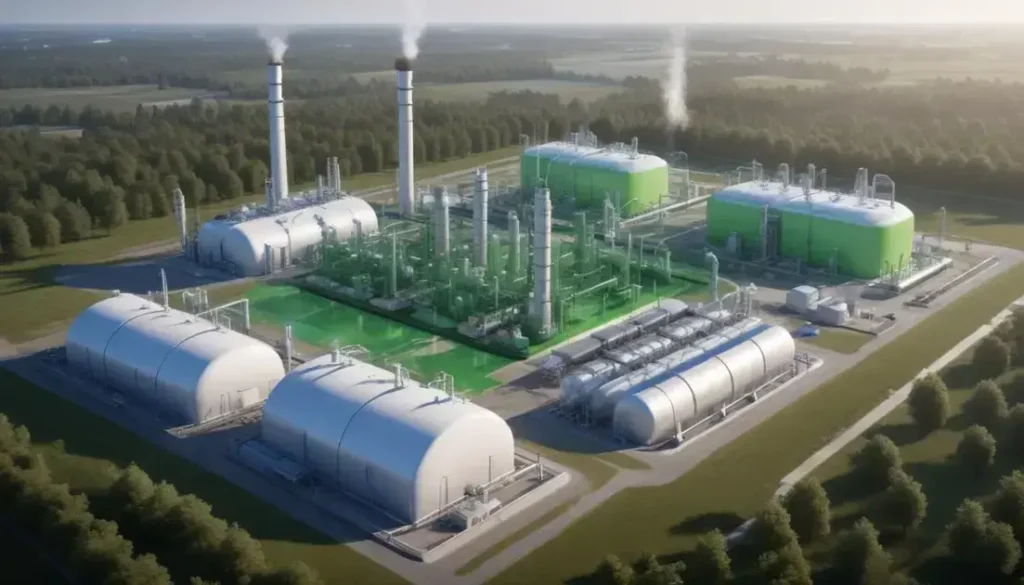The UK aims to achieve a carbon-neutral economy by investing in renewable energy, enhancing manufacturing sustainability, and embracing circular economy principles to reduce environmental impact while meeting evolving consumer demands.
The rise of Carbon Neutral initiatives reshapes automotive production. Volvo’s innovative steps towards sustainability invite discussion on their implications for the UK market. Are you ready to explore?
Introduction to Volvo’s sustainability goals
Volvo is at the forefront of the automotive industry, prioritising sustainability as a core aspect of its business strategy. The company has committed to becoming a fully electric car manufacturer by 2030, drastically reducing its carbon footprint. This ambitious goal reflects a broader trend in the automotive sector towards cleaner energy.
Central to Volvo’s sustainability objectives is the Carbon Neutral initiative, aiming for climate-positive operations across all its facilities. The company plans to achieve this by 2040 through investments in renewable energy and circular manufacturing processes.
An essential part of this journey involves enhancing the efficiency of electric vehicles and incorporating sustainable materials into vehicle production. Volvo’s approach includes the use of recycled plastics and bio-based materials, which significantly reduce environmental impact while meeting consumer demands for green technologies.
Furthermore, Volvo’s long-term strategy also addresses the need for renewable energy sources in its manufacturing plants. This integration not only helps in minimising emissions but also contributes to the overall well-being of the communities where these facilities are located. By championing such initiatives, Volvo sets a precedent for other manufacturers, demonstrating that sustainability is both feasible and essential for future growth.
Overview of the ES90 model
The Volvo ES90 model represents a significant leap in the brand’s commitment to sustainability and innovation. Designed as an all-electric vehicle, it embodies cutting-edge technology aimed at reducing the carbon footprint. This model showcases Volvo’s vision of a future where every aspect, from production to end-user, prioritises environmental responsibility.
Equipped with an advanced battery system, the ES90 provides a remarkable driving range that rivals traditional fuel vehicles. With fast-charging capabilities, it ensures that drivers can enjoy convenience without sacrificing performance. The incorporation of smart technology enables seamless connectivity, enhancing the overall driving experience.
Safety is paramount in Volvo’s design philosophy, and the ES90 is no exception. This model includes a myriad of cutting-edge safety features designed to protect passengers and pedestrians alike. Features such as automatic emergency braking and lane-keeping assistance contribute to making the ES90 one of the safest vehicles on the road.
Beyond engineering, the interior design of the ES90 reflects a commitment to using sustainable materials. From recycled plastics to responsibly sourced textiles, the vehicle showcases how luxury and eco-friendliness can coexist, meeting the demands of modern consumers who value sustainability as much as style.
Mechanisms of carbon-neutral energy for EVs
The transition to carbon-neutral energy for electric vehicles (EVs) is crucial in combating climate change. This process involves several mechanisms that ensure the power used to charge EVs comes from renewable sources. Solar, wind, and hydropower are at the forefront of this green energy revolution. By harnessing these resources, EVs can significantly lower their overall emissions.
Solar energy is particularly effective, with many EV owners installing solar panels at home to charge their vehicles sustainably. This not only reduces reliance on conventional power grids but also promotes energy independence. Additionally, advancements in energy storage technologies allow for the efficient capture and use of solar energy, even when the sun isn’t shining.
Wind energy also plays a vital role in powering EVs. Wind farms are increasingly used to supply electricity directly to the grid, making it available for charging stations. This integration leads to a significant decrease in the carbon footprint associated with EVs.
Furthermore, carbon offsetting initiatives can complement the shift towards renewable energy. By investing in projects that reduce emissions elsewhere, such as reforestation or sustainable farming, the automotive industry can work towards balancing out any unavoidable emissions.
Life Cycle Assessment (LCA) explained
Life Cycle Assessment (LCA) is a comprehensive method for evaluating the environmental impact of a product throughout its entire life cycle. This includes every stage, from raw material extraction and production to use and disposal. By assessing the environmental implications at each stage, companies like Volvo can make informed decisions to enhance sustainability.
During the production phase, the LCA examines factors such as energy consumption, waste generation, and resource depletion. For electric vehicles, this stage is crucial, as it determines the initial carbon footprint before the vehicle even hits the road. Materials like lithium and cobalt, essential for batteries, must be sourced sustainably to reduce impact.
The use phase focuses on the operational energy consumption of the vehicle. EVs generally show significant reduction in emissions compared to traditional vehicles when powered by renewable energy. The LCA considers fuel efficiency and associated emissions which vary based on user behaviour and driving conditions.
Finally, the disposal phase evaluates the end-of-life impacts, including recycling and waste management. Proper recycling of batteries and materials can significantly mitigate the environmental consequences. By embracing LCA, manufacturers can continuously improve their products, ensuring aligned with sustainability objectives and customer expectations.
Impact of renewable energy on carbon footprint
The impact of renewable energy on the carbon footprint of electric vehicles (EVs) is significant and transformative. By utilising energy sources like solar, wind, and hydropower, the overall environmental effects associated with vehicle usage can be drastically reduced. This transition to clean energy is pivotal in mitigating climate change.
When EVs are charged from renewable sources, their operational emissions drop close to zero. This shift not only lowers the carbon emissions during the use phase of vehicles but also enhances the sustainability of the energy grid itself. As more consumers embrace clean energy for their EVs, the demand for fossil fuels declines, promoting a shift towards a greener economy.
Furthermore, the lifecycle of renewable energy systems plays a crucial role in overall emissions reduction. By investing in solar panels or wind farms, manufacturers can create a sustainable energy ecosystem that supports both vehicle operation and energy production. This synergy allows for effective carbon offsetting, helping to counterbalance emissions attributed to vehicle production and materials.
Moreover, as technology advances, the efficiency of renewable energy generation continuously improves. With innovations in energy storage and grid management, the reliance on intermittent energy sources becomes more feasible, pushing the automotive industry further toward a carbon-neutral future.
Market comparison: ES90 versus other models
The Volvo ES90 stands out in the electric vehicle market, yet it faces competition from several key players. Comparing the ES90 to other models helps to illustrate its unique features and advantages. One notable competitor is the Tesla Model S, known for its impressive range and performance. However, the ES90 offers a superior focus on sustainability and safety, appealing to environmentally conscious consumers.
When examining range, the ES90 delivers competitive mileage per charge, similar to that of the Model S. However, its emphasis on energy efficiency and use of renewable materials sets it apart. This commitment offers an attractive proposition for buyers prioritising ecological impact.
Another relevant comparison is with the Porsche Taycan. While the Taycan excels in performance and driving dynamics, the ES90 provides a more comprehensive package that includes advanced safety features and a luxurious interior. The ES90 also benefits from Volvo’s longstanding reputation for safety, which resonates strongly with many drivers.
Finally, the pricing of the ES90 positions it competitively within the segment, making it accessible to a broader audience. While premium brands like Audi and BMW may offer similar performance levels, the ES90’s focus on sustainability and safety may well sway potential buyers looking for a green alternative.
Insights from Volvo’s sustainability leaders
Insights from Volvo’s sustainability leaders highlight the strategic approach the company is taking towards being a carbon-neutral manufacturer by 2040. This vision is not merely aspirational; it is backed by specific, actionable plans that target every aspect of the manufacturing and operational processes.
One significant focus area is the integration of renewable energy into production facilities. By leveraging solar and wind power, Volvo aims to dramatically reduce the carbon footprint of its manufacturing operations. This commitment to green energy is fundamental to achieving sustainability targets and is highly regarded by industry experts.
Furthermore, Volvo’s leaders emphasise the importance of a circular economy model. By prioritising the use of recycled materials and implementing robust recycling processes for end-of-life vehicles, Volvo not only minimises waste but also sets a benchmark in the automotive sector for sustainable practices.
Communication is another key area highlighted by Volvo’s leadership. By engaging consumers and stakeholders on sustainability efforts, Volvo is fostering a culture of transparency and accountability. This proactive stance encourages other automotive firms to pursue similar sustainability initiatives, contributing to a larger industry shift towards environmentally responsible practices.
Future of carbon-neutral energy in the UK
The future of carbon-neutral energy in the UK looks promising, driven by governmental initiatives and technological advancements. The UK has set ambitious targets to reach net-zero emissions by 2050, and achieving this requires a significant overhaul of its energy system. A substantial focus is on increasing the share of renewable energy sources like wind and solar power.
The nation is already a global leader in offshore wind energy, and plans to expand this sector further will play a crucial role in transitioning to a low-carbon economy. By investing in energy storage technologies, the UK can ensure a stable supply of electricity, even when renewable generation fluctuates.
Moreover, innovations in green hydrogen production present exciting opportunities for the UK. This clean fuel can be derived from excess renewable energy and has the potential to decarbonise heavy industries and transport sectors. Initiatives encouraging the development of hydrogen infrastructure are gaining traction, creating a versatile energy future.
Furthermore, the transition to carbon-neutral energy in the UK also involves enhancing energy efficiency in homes and businesses. Government schemes aimed at retrofitting buildings can significantly reduce energy consumption, contributing to overall carbon-neutral goals.
Conclusion and implications for UK manufacturers
The implications of transitioning to a carbon-neutral economy are profound for UK manufacturers. As the country strives to meet stringent environmental targets, manufacturers must adapt to new regulations and consumer expectations. This shift presents both challenges and opportunities in the evolving market landscape.
Firstly, UK manufacturers will need to invest in cleaner technologies and sustainable practices. By enhancing operational efficiencies, firms can significantly reduce their carbon footprint while also cutting costs in the long run. Embracing innovations in renewable energy and employing sustainable materials will be essential for compliance with government policies and industry standards.
Moreover, there is a growing demand from consumers for environmentally friendly products. As awareness of climate change increases, buyers are more likely to support brands prioritising sustainability. This trend provides a unique opportunity for UK manufacturers to differentiate themselves and capture new market segments by offering eco-conscious products.
Additionally, collaboration across sectors can lead to more efficient production and distribution networks. Sharing best practices and technologies allows manufacturers to innovate collectively, driving progress and sustainability in the industry. Overall, manufacturers in the UK stand at a crucial juncture where proactive approaches to sustainability can pave the way for a resilient and competitive future.
In Summary: The Path to Sustainability in the UK
The journey towards a carbon-neutral economy in the UK is vital for both the environment and the economy. Manufacturers play a key role in this transition by adopting cleaner technologies and more sustainable practices.
As consumers increasingly seek eco-friendly products, manufacturers have the chance to lead the market with innovative green solutions. By investing in renewable energy and sustainable materials, companies can not only comply with regulations but also respond to consumer demand.
Collaboration between sectors can enhance efficiency and drive progress, ensuring all benefit from this shift. By embracing sustainability, UK manufacturers can build a resilient future, paving the way for economic growth while protecting the planet.
Ultimately, the commitment to sustainability is essential for the survival of businesses and the well-being of future generations.
Frequently Asked Questions
What are the benefits of transitioning to a carbon-neutral economy for manufacturers?
Transitioning to a carbon-neutral economy can enhance efficiency, reduce costs in the long run, and improve brand reputation by meeting consumer demand for sustainable products.
How can UK manufacturers implement sustainable practices effectively?
UK manufacturers can start by investing in renewable energy sources, adopting circular economy principles, and continuously improving operations to reduce their carbon footprint.
What role does consumer demand play in shaping sustainable practices?
Consumer demand greatly influences manufacturers to adopt sustainable practices as buyers increasingly prefer eco-friendly products and companies that prioritise sustainability.
How can collaboration across sectors improve sustainability efforts?
Collaboration allows manufacturers to share best practices, innovative technologies, and resources, leading to more efficient production and a greater impact on sustainability.
What are some examples of renewable energy sources for manufacturing?
Common renewable energy sources include solar, wind, and hydropower, which can be harnessed to power manufacturing facilities and reduce emissions.
How does investing in sustainability affect long-term business growth?
Investing in sustainability can lead to cost savings, better compliance with regulations, and increased customer loyalty, ultimately driving long-term business growth.


